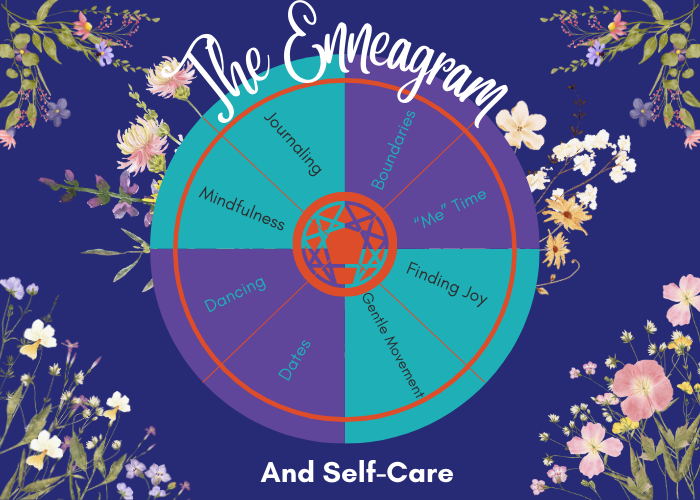ur previous post on the Enneagram types and what they need from relationships inspired this week’s post! This post focuses on the topic of self-care. Knowing your Enneagram type can help guide you towards the type of self-care which may be most helpful for you.
Enneagram One: Reformer
Type 1’s benefit from fun, adventure, and opportunities to be playful. But they can also struggle to relax. Activities that allow them to let go of their need for perfection and control are ideal, such as scheduling “unproductive time”. Unproductive time is exactly what it sounds like. Time spent doing something that doesn’t have a specific goal. Some examples include: journaling, meditation, a solo dance party, and creative activities.
Enneagram Two: Helper
Two’s put others first over self-care and are extremely generous. This means it is important for them to set boundaries in relationships. Not only that, but they need to schedule “me” time, reflect on their own needs, and limit overcommitment. It’s important to learn how to say “no”! For example: crafting, enjoying nature, taking themselves on a date, and expressing their emotions.
Enneagram Three: Achiever
Type 3’s are always focused on their next accomplishment and strive to be seen as admirable and impressive. It’s important for them to connect with their true self and their true emotions. Focusing on those accomplishments can make it difficult for them to take time and focus on their inner selves. Anything that nurtures their emotional well-being and cultivates a deeper sense beyond their accomplishments is recommended. Some examples include: exploring new hobbies, self-reflection, and mindfulness.
Enneagram Four: Individualist
Four’s seek authentic identity and self-expression above all else so focusing on stability and consistency is important. These individuals can be incredibly creative but they can also let important, every-day activities fall to the side. Mundane tasks like making their bed and doing the dishes is a great start. It’s especially important for them to make this a regular routine. Other examples: creative expression, connecting with nature, reflective journaling, and cultivating gratitude.
Enneagram Five: Investigator
Type 5’s strive to be competent and self-reliant, always acquiring new knowledge but not always growing from it. It’s great to spend time learning, but it’s important to fully learn from the things we look into. It is recommended that they pursue learning joyfully and with intention. Dancing is one of the most therapeutic activities for this type as it is a great opportunity for joy. Other examples include: establishing a self-care routine, scheduling social time, and getting active.
Enneagram Six: Loyalist
Type 6’s are responsible with a focus on safety and security. That focus on safety can sometimes contribute to anxiety and overthinking. Because of this overthinking, reading something boring or changing up their routine is helpful. Other examples include: grounding exercises, stepping out of their comfort zone, and practicing self-compassion.
Enneagram Seven: Enthusiast
Seven’s prioritize happiness and experiences. They have a difficult time sitting still or being bored. They can also have a hard time dealing with difficult emotions, either their own or the emotions of others. Therefore, it is important for them to face unpleasantness head-on. Some examples include: practicing active listening, planning things out, and quiet time.
Enneagram Eight: Challenger
Type 8’s are known to push themselves beyond their limits. This can come across as superhuman. Many times they can have bottled up negative emotions that they haven’t dealt with. It is important for them to embrace counseling, explore what is underneath their anger, and practice empathy. Some examples include: being vulnerable, letting go, and creating a relaxation ritual.
Enneagram Nine: Peacemaker
Type 9’s are usually unaware of what they truly want in life. They have the tendency for self-numbing, so it is important for them to find balance. Their desire to make everyone else comfortable can result in them getting lost. Examples include: setting “do not disturb” time, verbalizing their preferences, and establishing personal goals. It is recommended that they create a cozy space in their homes and engage in gentle movement, like stretching.
Consider Us
The consultants at Compassionate Consulting Company are licensed independent clinical social workers located in Massachusetts who have been running successful counseling practices for years. Julia uses the Enneagram in her work with therapy clients, consulting clients, and also provides trainings to teams to improve communication and connection. If you are interested in learning more about the Enneagram or having Julia provide a training to your team, complete this form.





